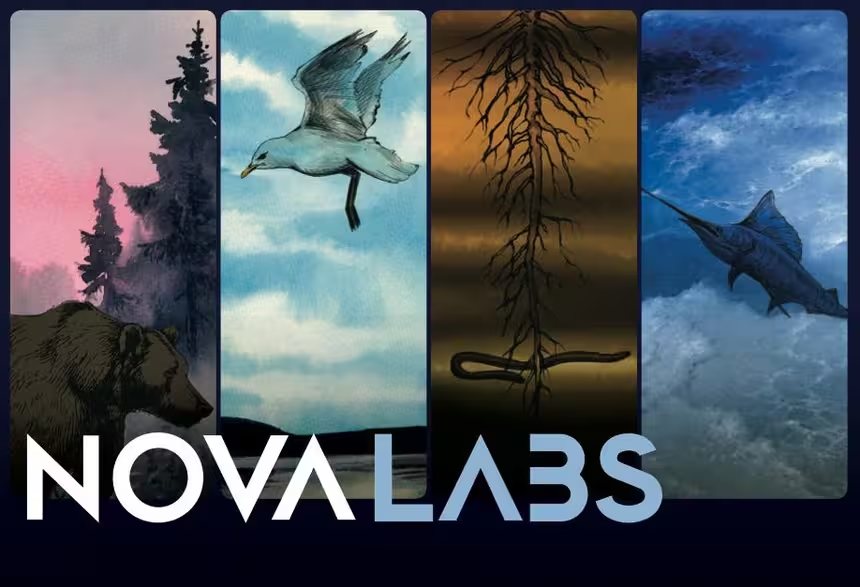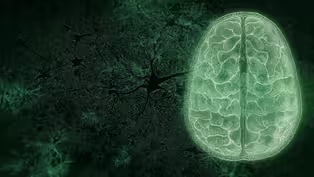
What Happens in the Brain When you Sleepwalk?
Clip: Season 50 Episode 10 | 3m 55sVideo has Closed Captions
Some people can do complex behaviors like walking and driving while sleeping.
Neuroscientist and clinical psychologist Heather Berlin visits a sleep center at the Icahn School of Medicine at Mount Sinai to learn what’s going on in the brain when someone sleepwalks.
Problems playing video? | Closed Captioning Feedback
Problems playing video? | Closed Captioning Feedback
National Corporate funding for NOVA is provided by Carlisle Companies and Viking Cruises. Major funding for NOVA is provided by the NOVA Science Trust and PBS viewers.

What Happens in the Brain When you Sleepwalk?
Clip: Season 50 Episode 10 | 3m 55sVideo has Closed Captions
Neuroscientist and clinical psychologist Heather Berlin visits a sleep center at the Icahn School of Medicine at Mount Sinai to learn what’s going on in the brain when someone sleepwalks.
Problems playing video? | Closed Captioning Feedback
How to Watch NOVA
NOVA is available to stream on pbs.org and the free PBS App, available on iPhone, Apple TV, Android TV, Android smartphones, Amazon Fire TV, Amazon Fire Tablet, Roku, Samsung Smart TV, and Vizio.
Buy Now

NOVA Labs
NOVA Labs is a free digital platform that engages teens and lifelong learners in games and interactives that foster authentic scientific exploration. Participants take part in real-world investigations by visualizing, analyzing, and playing with the same data that scientists use.Providing Support for PBS.org
Learn Moreabout PBS online sponsorship- Sleepwalking is a glitch in the system because our identity is not in control.
And that's what a lot of my patients tell me.
Like, I didn't do that.
That's not possible.
This is not me.
(cutlery clanging) (water running) (playful music) So sleepwalking, very common condition or phenomenon.
Simply says what the word is, you sleep but during your sleep, you will walk.
We take it for granted, right?
But the walking is extremely complex.
Just teaching a robot all the inputs and outputs for a body to move forward on two legs without falling, all of this, you don't even think about it.
It works independently.
(pensive music) - How is it possible to do complex behaviors like walking, eating, and sometimes even driving while sleeping?
To find out, I'm visiting a sleep center at the Icahn School of Medicine at Mount Sinai.
So tell me a little bit about what's happening with you at night and your sleepwalking.
- Well, I've been doing some weird things.
I painted a wall in my living room and went in my kitchen.
I made a triangle, a perfect triangle in my kitchen.
- So what do you think when you find that?
- I don't know, I laugh because how the heck I did this?
- Emmanuel During studies what's going on in the brain when someone sleepwalks.
In the center, sleep patients are wired up with sensors that pick up eye and body movements, as well as their brain waves while they sleep.
So what are we looking at here, these blue lines?
- [Emmanuel] These are the eye movements.
- [Heather] Okay.
And then the black lines here?
- These are the brain waves.
So these patients obviously is lying in bed and doses off slowly, feels sleepy.
And as we move on, she dives into deep, slow wave sleep.
- [Heather] During sleep, your brain cycles through phases of high and low activity.
When the brainwaves slow down, scientists call this deep sleep.
But when someone sleep walks.
- First of all, everything looks good.
You see the brain waves, everything is very monotonous, sort of slow waves.
And then it's interesting, there's a buildup of slow wave that the amplitude goes up and then suddenly.
(dramatic music) - [Heather] Whoa.
- [Emmanuel] So he's seemingly awake.
Sudden.
Looks like a sudden arousal.
- [Heather] Looks sort of scared.
- Very, very, very fast.
Eyes open.
There's a sort of a split then.
- [Heather] The patient looks like they're awake but a couple of key brain regions seem to stay asleep.
- There's part of the brain stays in slow wave sleep.
It's such a deep stage of sleep.
It's hard to wake up and the other part of the brain is already awake.
- [Heather] One part of the brain that doesn't wake up during sleepwalking is called the prefrontal cortex.
It's the region of the brain responsible for deliberate choices and self-awareness.
- This prefrontal cortex is the decision maker.
The other areas of the brain can mostly work independently of that.
So essentially, so many parts of the brain can be engaged without conscious awareness of it.
- [Heather] During sleepwalking, the motor cortex, which controls movement, the visual cortex, which processes visual information and the parts of the brain that coordinate behaviors, like balance and speech can all become active without engaging the prefrontal cortex.
- [Interviewer] And what exactly are you doing, ma'am?
- It's a special code.
(lively music)
How Trauma Can Alter Your Biology
Video has Closed Captions
Clip: S50 Ep10 | 4m 40s | Your ancestors' experiences might influence how your brain is wired today. (4m 40s)
What If Part of Your Brain Was Missing?
Video has Closed Captions
Clip: S50 Ep10 | 2m 29s | An injury cost Phineas Gage part of his brain, but he lost something else too. (2m 29s)
Your Brain: Who's in Control? Preview
Video has Closed Captions
Preview: S50 Ep10 | 29s | Dive into the subconscious to see what’s really driving the decisions you make. (29s)
Providing Support for PBS.org
Learn Moreabout PBS online sponsorship
- Science and Nature

Capturing the splendor of the natural world, from the African plains to the Antarctic ice.













Support for PBS provided by:
National Corporate funding for NOVA is provided by Carlisle Companies and Viking Cruises. Major funding for NOVA is provided by the NOVA Science Trust and PBS viewers.





